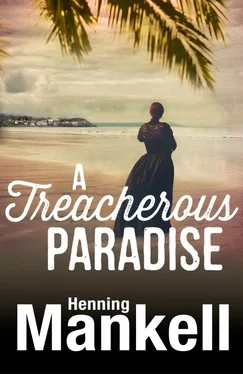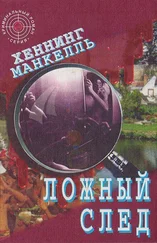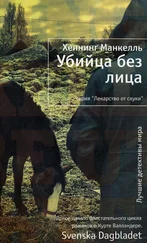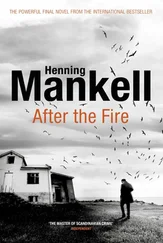‘Of course not,’ said the captain.
He doesn’t believe me, Hanna thought. Or at least, he doesn’t believe what I say. Why should he, after all?
They walked around the ship, and took a good look at the Norwegian forest cat that had come on board in Sundsvall and was now curled up fast asleep down at the bottom of a large coil of hawser.
‘How about Berta?’ Hanna asked apropos of nothing. ‘Is she still at Forsman’s place?’
‘She’s had a baby,’ said the captain. ‘I don’t know who the father is, but Forsman has allowed her to stay on in his house.’
Hanna immediately assumed that Forsman himself was the father of the child. Otherwise he would never have allowed Berta to stay.
Berta’s loneliness, she thought. And mine. Is there really any difference between them?
A black man came running along the quay. He had a packet in his hand. It contained the photographs from Picard. The captain and Hanna opened the envelope. The black and white picture was a true image of what she looked like, she realized. A woman, still very young, looking frankly and unhesitatingly straight at the camera.
‘Both Forsman and your mother will be very pleased,’ said the captain. ‘Forsman will probably be extremely relieved to discover that you are alive.’
He had one last question for her before they took leave of each other by the gangplank.
‘Where shall I tell them you are working?’
‘At a hotel,’ she said. ‘The Paradise Hotel.’
They shook hands. She didn’t look back after leaving the ship.
The following day when she returned to the harbour, the ship had left.
A few days later. The sea was calm, no cooling breezes were blowing along the dusty streets.
One night Hanna woke up, feeling as if somebody had hit her. Carlos had shouted out from his perch on the ceiling light, then jumped down on to the bed. Hanna knew that monkeys screamed in a special way when they were warning others in the troop about a snake or some other danger they had become aware of. She lit the paraffin lamp next to her bed. When it radiated its flickering light around the room, Carlos seemed to calm down immediately. She thought he must have had a nightmare, something she had suspected on previous occasions when he had started whimpering restlessly in bed, and the following day seemed to be gloomily introspective and preoccupied.
But something was still worrying him. He had climbed up on to the window ledge and was now sitting behind the curtain. When Hanna opened it she found herself looking straight out into the brief tropical dawn — but she could also see smoke and flames rising from a block not far from the brothel. When she opened the window she could also hear shouts and screams in the distance. Carlos climbed out on to the roof, and didn’t come back despite her calling for him.
She aimed her binoculars at the centre of the blaze. The dawn light was still only faint, but she could see right away that it was no ordinary fire. Black men were running around with cudgels and bows and arrows in their hands. They were throwing stones and burning bundles of twigs at the soldiers from the Portuguese garrison who had assembled there. Hanna could see bodies lying in the street, but she couldn’t make out if they were black or white.
She put down the binoculars and tried to work out what was happening. Then she pulled the bell cord — hard, so that there should be no doubt about her wanting a servant to come to her room without delay, despite the fact that all of them except Anaka were bound to be still asleep.
In fact it was Julietta who came, half-dressed and unkempt, but Hanna could see immediately that she was wide awake. Presumably the others in the house had also realized what was happening down below in the town, and told the youngest of them to answer the bell.
Hanna took Julietta out on to the veranda with her.
‘What’s going on?’ she asked.
‘People are angry.’
‘Who’s angry?’
‘We are angry.’
As Julietta said those last words, she also did something out of the ordinary. She looked Hanna in the eye. It was as if she had been stung, Hanna thought. What’s going on in the street down below evidently concerns me as well.
‘Why are you angry?’ Hanna asked. ‘Please tell me without me having to drag it out of you.’
‘A white man broke a woman’s water pitcher.’
Hanna was irritated by the answer, which didn’t give her any understandable context. She angrily told Julietta to go and fetch Anaka. When Anaka arrived, she was if anything even more laconic than Julietta.
Hanna got dressed and thought it was lucky that she was expecting a visit from Andrade that morning, with some papers for her to sign. Nobody knew more than he did about what went on in town, whether it happened openly or on the sly. As she was having breakfast, waiting for his arrival, she occasionally went out on to the veranda and took another look through her binoculars. The fire was still burning, and it seemed as if new ones had been started, although they were hidden behind buildings and out of range of the binoculars. She could hear distant shouting and the rattle of gunfire. Carlos was sitting motionless on the roof, following the action.
When Andrade arrived he was red in the face and more agitated than she had ever seen him before. She noted that he had been impolite to her servants, and that he slammed a revolver on to the coffee table before sitting down. Before she had time to ask him any questions, he started to explain what had happened that morning. The sudden uprising had begun a few hours earlier when a group of black men had come marching in from the slums. They had carefully avoided the streets that were usually patrolled by Portuguese soldiers ensuring that the night curfew was observed. Once they had reached the centre of town they had run to a police station and set it on fire by throwing bottles full of paraffin through the windows. The half-asleep soldiers had started shooting the rioters, and then bloody chaos had taken hold.
‘So it’s an uprising,’ said Hanna. ‘There must be a reason for it.’
‘Must there?’ asked Andrade ironically. ‘These black savages need no reason other than their inherited bloodthirstiness to start a riot that can only lead to their own destruction.’
Hanna found it difficult to believe him. It surely couldn’t be as simple as he suggested. As early as the day when Captain Svartman’s ship had docked in Lourenço Marques, she had thought she could detect hostility and sadness in the eyes of the blacks. She was living in a sad continent where the only ones who laughed — often far too loudly — were the white people. But she was well aware that the laughter was usually no more than a way of disguising apprehension that could easily grow into fear. A fear of darkness, of the people who lived in darkness but couldn’t be seen.
Hanna insisted. Something must have triggered the fury of the blacks. Andrade shrugged impatiently.
‘No doubt somebody thought he had been treated unfairly and thought it was necessary to die if needs be in order to avenge the perceived injustice. But it will soon pass. If there’s one thing I know about these black people, it’s that they are cowards. They run away like terrified dogs when things get serious.’
He picked up the revolver from the table.
‘To be honest I would prefer our meeting to be postponed until tomorrow morning. Calm will have been restored by then, the worst of the troublemakers will be dead and the others will be locked up in the fort. What I feel I must do now is go down to where the fires are burning. I belong to the town’s civil militia who have been trained to stand shoulder to shoulder with the soldiers whenever there is a threat to our safety. I can certainly be of some use with the aid of this revolver.’
Читать дальше












